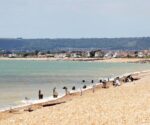Outrage in Tenerife as £347 fine issued after popular beach closed for nearly a year | Travel News | Travel
Residents have been left furious after the Tenerife Cabildo, the governing body of the popular Spanish island, has been fined just €400 (£347) for wastewater discharges that led to the closure of Playa Jardín beach in Puerto de la Cruz for nearly a year. The fines were issued by the Canary Islands’ Agency for the Protection of the Natural Environment and amount to €200 (£174) each – relating to two separate infractions in late 2024 and mid-2025 – which has sparked local outrage given the scale and impact of the issue.
Playa Jardín, a major tourist attraction composed of three distinct coves, Castillo, El Charcón and Punta Brava, was officially designated as not fit for bathing from July 2024 until mid-June 2025 due to repeated poor water quality. The area most affected was Punta Brava, the largest and most popular cove, which lies closest to the discharges. Both of the issued sanctions cite failure to comply with one of 10 conditions required for wastewater discharge permits. However, the Cabildo has already appealed both penalties, claiming they are unfounded and that no real breach occurred.
Much of the anger stems from the fact that the same environmental agency had previously fined Puerto de la Cruz City Council far higher amounts for similar offences. Between 2018 and 2022, they were fined a total of €12,600 (£10,943) for unauthorised discharges from pumping stations at Playa Chica, San Telmo and El Caletón, according to Canarian Weekly.
In contrast, the Cabildo, despite being the body with the greatest responsibility for water quality, received no fines until the end of 2024, even though a major pipeline rupture was reported as early as July 2020. The agency claims the delay in sanctions was due to not receiving formal notice from the Canary Islands’ Department for Ecological Transition.
Investigations only began following a public outcry and judicial complaints filed in late 2024.
According to the Agency for the Protection of the Natural Environment, the fines were limited because the Cabildo had the appropriate permits and infrastructure in place. One penalty addressed discharges occurring before wastewater reached the Punta Brava pipeline, while the other concerned stormwater overflows from the local treatment plant. The Cabildo has argued these events were managed appropriately and should not warrant any penalties.
Currently, the City Council of Puerto de la Cruz faces eight more active investigations for unauthorised discharges in areas including Calle Pelimar, El Caletón, Playa Chica and San Telmo. Five of these involve residual wastewater reaching the sea.
This anger comes as two more beaches in El Médano, southern Tenerife, have been forced to close following issues with the local wastewater outfall system. La Jaquita and La Batata beaches, both frequented by locals and tourists, were shut down as a precautionary measure following technical reports indicating that the emissary – responsible for safely channelling treated wastewater away from the coast – was not functioning properly.
The Granadilla de Abona Town Hall has not provided a timeframe for when the beaches might reopen. It states that the closures will remain in place until the issue is fully resolved and public safety can be guaranteed. The council is urging the public to respect all signage and beach closures, noting that unauthorised access to the water could pose health risks.
“El Médano is known for its beaches and natural charm,” said a council spokesperson. “We understand this is disappointing, especially during the summer season, but the safety of beachgoers is our top priority.”








